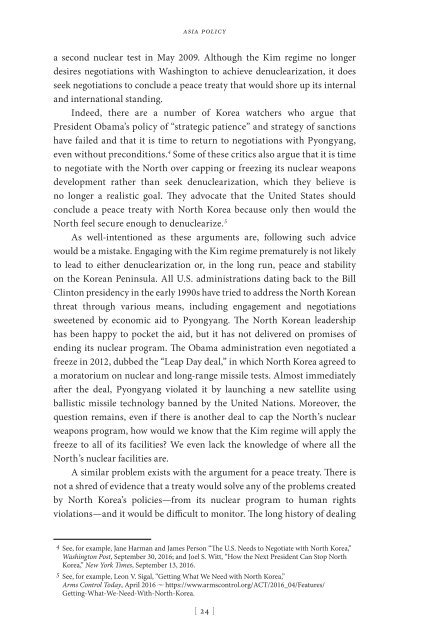2jBVKVf
2jBVKVf
2jBVKVf
Create successful ePaper yourself
Turn your PDF publications into a flip-book with our unique Google optimized e-Paper software.
asia policy<br />
a second nuclear test in May 2009. Although the Kim regime no longer<br />
desires negotiations with Washington to achieve denuclearization, it does<br />
seek negotiations to conclude a peace treaty that would shore up its internal<br />
and international standing.<br />
Indeed, there are a number of Korea watchers who argue that<br />
President Obama’s policy of “strategic patience” and strategy of sanctions<br />
have failed and that it is time to return to negotiations with Pyongyang,<br />
even without preconditions. 4 Some of these critics also argue that it is time<br />
to negotiate with the North over capping or freezing its nuclear weapons<br />
development rather than seek denuclearization, which they believe is<br />
no longer a realistic goal. They advocate that the United States should<br />
conclude a peace treaty with North Korea because only then would the<br />
North feel secure enough to denuclearize. 5<br />
As well-intentioned as these arguments are, following such advice<br />
would be a mistake. Engaging with the Kim regime prematurely is not likely<br />
to lead to either denuclearization or, in the long run, peace and stability<br />
on the Korean Peninsula. All U.S. administrations dating back to the Bill<br />
Clinton presidency in the early 1990s have tried to address the North Korean<br />
threat through various means, including engagement and negotiations<br />
sweetened by economic aid to Pyongyang. The North Korean leadership<br />
has been happy to pocket the aid, but it has not delivered on promises of<br />
ending its nuclear program. The Obama administration even negotiated a<br />
freeze in 2012, dubbed the “Leap Day deal,” in which North Korea agreed to<br />
a moratorium on nuclear and long-range missile tests. Almost immediately<br />
after the deal, Pyongyang violated it by launching a new satellite using<br />
ballistic missile technology banned by the United Nations. Moreover, the<br />
question remains, even if there is another deal to cap the North’s nuclear<br />
weapons program, how would we know that the Kim regime will apply the<br />
freeze to all of its facilities? We even lack the knowledge of where all the<br />
North’s nuclear facilities are.<br />
A similar problem exists with the argument for a peace treaty. There is<br />
not a shred of evidence that a treaty would solve any of the problems created<br />
by North Korea’s policies—from its nuclear program to human rights<br />
violations—and it would be difficult to monitor. The long history of dealing<br />
4 See, for example, Jane Harman and James Person “The U.S. Needs to Negotiate with North Korea,”<br />
Washington Post, September 30, 2016; and Joel S. Witt, “How the Next President Can Stop North<br />
Korea,” New York Times, September 13, 2016.<br />
5 See, for example, Leon V. Sigal, “Getting What We Need with North Korea,”<br />
Arms Control Today, April 2016 u https://www.armscontrol.org/ACT/2016_04/Features/<br />
Getting-What-We-Need-With-North-Korea.<br />
[ 24 ]


